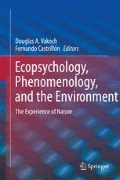Abstract
This chapter offers a defense of those forms of environmental ethics and ecopsychology that appeal to direct first-person emotive experiences of the natural world. Inspired by the work of Aldo Leopold, Arne Naess, and Val Plumwood, I will show that a phenomenology of moral experience and personal identity makes possible an understanding of an ecologically informed self-identity adequate to serve as a point of departure for a non-anthropocentric ethic of care and connectedness to others. I shall argue that the ecological self, as a form of personal identity, is able to integrate three layers of selfhood, the body self, the narrative self, and the reflective self, into a form of moral subjectivity that gives voice and respect to the complexity and varieties of moral experience. The ecological self, understood in this way, supports an ethical and healing relation to the natural world by recovering and integrating into its identity qualities which have been systematically denied by the modern separation of self and other, culture and nature, human and animal, and reason and emotion. This chapter argues that moral experience is structured by a prima facie form of rationality inherent in the intentional structure of experience. Consequently, the first-person moral experience that naturally flows from an ecological self cannot be easily dismissed as “mere subjectivity” as the dominant forms of modern moral theory are quick to do. Furthermore, the resulting understanding of moral subjectivity and the intentional structure of moral experience leads to a perspectival and pragmatic, rather than a metaphysical, understanding of value, thereby undercutting the worry of eco-fascism that has plagued eco-philosophies such as Leopold’s land ethic and Naess’s deep ecology. In turn, this understanding of moral experience and an ecologically informed personal identity opens up a new way of understanding the task of moral philosophy.
Access this chapter
Tax calculation will be finalised at checkout
Purchases are for personal use only
References
Beyer, J. (2014). A phenomenology of intimate relating and identification with the whole (and the tale of the woefully misguided aspirations of the common land barnacle). In D. A. Vakoch & F. Castrillon (Eds.), Ecopsychology, Phenomenology & the Environment: The Experience of Nature. New York: Springer.
Brown, C. (2003). The real and the good: Phenomenology and the possibility of an axiological rationality. In C. Brown & T. Toadvine (Eds.), Eco-phenomenology: Back to the Earth itself. Albany: SUNY Press.
Brown, C. (2010). Defending the indefensible: A dialogical and feminist critique of just war theory. Skepsis, XXI/i: 87—106.
Brown, C. (2011). The unity of eco-phenomenology: A reply to Thompson. In A. Fausgstad Aaro & J. Servan (Eds.), Environment, embodiment, and gender. Bergan: Hermes Text.
Callicott, J. B. (1989). The conceptual foundations of the Land Ethic. In J. B. Callicott (ed.), In defense of the land ethic: Essays in environmental philosophy. (pp. 75–99). Albany: SUNY Press.
Casey, E. S. (2003). Taking a glance at the environment: Preliminary thoughts on a promising topic. In C. S. Brown & T. Toadvine (Eds.), Eco-phenomenology: Back to the Earth itself. Albany: SUNY Press.
Darwin, C. (1972). The descent of man. New York: The Heritage Press. First published as The descent of man, and selection in relation to sex. London: John Murray, 1871.
Hatab, L. J. (2000). Ethics and finitude: Heideggerian contributions to moral philosophy. Oxford: Rowman and Littlefield Publishers.
Husserl, E. (1970). The crisis of European sciences and transcendental philosophy. Translated by D. Carr. Evanston: Northwestern University Press.
Konopka, A. (2012). The environed body: The lived situation of perceptual and instinctual embodiment. Studia Phaenomenologica XII/201: 289–308.
Leopold, A. (1949). A sand county Almanac and sketches here and there. Oxford: Oxford University Press.
Mohanty, J. N. (2000). The self and its other: Philosophical essays. Oxford: Oxford University Press.
Naess, A. (1988). Self-realization: An ecological approach to being in the world. In J. Seed, J. Macy, P. Fleming, & A. Naess (Eds.), Thinking like a mountain: Towards a council of all beings (pp. 19–30). Philadelphia: New Society Publishers.
Naess, A. (2001). The shallow and the deep, long range ecological movement. In L. Pojman (Eds.), Environmental ethics: Readings in theory and application. Wadsworth Publishing Company. Originally published in Inquiry (Vol. 16 Spring 1973).
Plumwood, V. (1993). Feminism and the master of nature. London and New York: Routledge.
Plumwood, V. (1998). Nature, self, and gender, feminism, environmental philosophy, and the critique of rationalism. In D. Vandeveer & C. Pierce (Eds.), The environmental ethics and policy book. Wadsworth Publishing Company. Originally published in Hypathia (Vol. 6, No. 1, Spring), pp. 3–27.
Regan, T. (1983). The case for animal rights. Berkeley: University of California Press.
Wood, D. (2003). What is eco-phenomenology? In C. S. Brown & T. Toadvine (Eds.), Eco-phenomenology: Back to the Earth itself. Albany: SUNY Press.
Author information
Authors and Affiliations
Corresponding author
Editor information
Editors and Affiliations
Rights and permissions
Copyright information
© 2014 Springer Science+Business Media New York
About this chapter
Cite this chapter
Brown, C. (2014). The Who of Environmental Ethics: Phenomenology and the Moral Self. In: Vakoch, D., Castrillón, F. (eds) Ecopsychology, Phenomenology, and the Environment. Springer, New York, NY. https://doi.org/10.1007/978-1-4614-9619-9_9
Download citation
DOI: https://doi.org/10.1007/978-1-4614-9619-9_9
Published:
Publisher Name: Springer, New York, NY
Print ISBN: 978-1-4614-9618-2
Online ISBN: 978-1-4614-9619-9
eBook Packages: Behavioral ScienceBehavioral Science and Psychology (R0)

